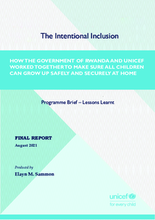This present report describes the childcare reform process in Rwanda during 2020 and 2021, against the background of the overall reform initiated since 2012.
Overview
During the last ten years, the Government of Rwanda and UNICEF have been collaborating on childcare reform. Beginning in March 2012, the Government endorsed the Strategy for National Child Care Reform. The implementation mechanism for this strategy is the Tubarerere Mu Muryango (TMM) programme (Let’s raise children in families) led by the National Child Development Agency (NCD) in collaboration with UNICEF.
The TMM programme aims to ensure that:
- children living in institutional care in Rwanda are reunited with their families or placed in suitable forms of family-based alternative care, and that
- children in families are prevented from separating.
The programme uses the childcare reform as a springboard for wider strengthening of the child protection system.
To avoid stigmatization and discrimination intentionally inclusive design was considered from the start as more appropriate than development of a stand-alone and parallel system for children with disabilities. Although the first phase of TMM did not have a specific focus on residential institutions for children with disabilities it nevertheless included reintegration of several children with disabilities who were residing in the target institutions. However, a 2018 evaluation of the TMM first phase reported that placement of children with disabilities into families utilizing the existing model was challenging. Thus when the second phase of TMM was initiated in 2019 the design was revised to make it more intentionally inclusive; and the collaborating partnership expanded to include the National Council of Persons with Disabilities (NCPD).
Despite the challenges of the last 18 months, including the global COVID-19 pandemic and extensive re-structuring at the NCD, as of June 2021 3,391, children and young adults have been placed with families, 14 of them from institutions for children with disabilities.

